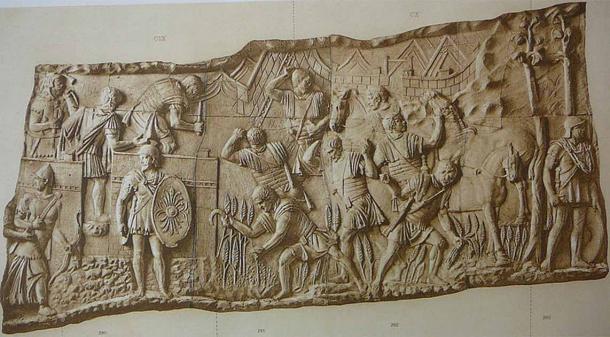Frumentarii - The Roman Emperor’s Eyes and Ears
Throughout the world’s history, many of the kingdoms, empires, and rulers depended on some sort of a secretive assistance. Powerful realms are like intricate machines - filled with secrets. To uncover those secrets, the rulers relied on spies, secret police, assassins, and all sorts of henchmen that had to hide and use deception. The Roman Empire was no exception. In its history, the emperors of Rome utilized the Frumentarii, the Roman “intelligence agency”. Without them, many of the shrewd moves made by emperors would not have been possible.
The Frumentarii Lurk from the Shadows
In almost all forms of government, the need for special services and secret agents is very high. Ancient kingdoms and empires were not an exception, as they too were a complex web of intrigues and feuds, and rulers had many enemies - both within and without. “The walls have ears”, the ancient saying goes, and sometimes it was exactly like this. In the Roman Empire, the Emperor had to know his enemies and his allies. The former sometimes lurked so close to him, perhaps even at the court. And how to find them out? Spies and deception, of course!
- The Praetorian Guards: To Serve and Protect the Roman Emperors… Most of the Time
- Is the Famous Roman Leader Pompey History’s Biggest Loser?

The Frumentarii, secret informers and spies in the military force. Espionage was not only of the enemy but for revealing traitors and defeatists. (Public Domain)
The Frumentarii have very distant origins. For ages it was the Roman military practice to utilize the services of informers, spies, and assassins. However, they were never an organized unit. This was likely changed during the reign of Emperor Domitian, who was at the throne from 81 to 96 AD. The name “Frumentarii” began appearing in records just shortly after his reign. Originally, however, they were described as simple “messengers”, as well as collectors of tax money. This could have been a simpler role that hid their true nature.
Either way, after the end of the Flavian Dynasty, whose last ruler was Domitian, the Frumentarii received their true identity - a strict and secretive police force. From the start, they were a part of the military, and virtually all of their members were once legionaries, recruited from the ranks. The Frumentarii were based in Castra Peregrina, “The Camp of the Strangers”, their own barracks situated on the Caelian Hill in Rome.
The Gestapo of Ancient Rome
Very early on the Frumentarii gained an infamous reputation. Originally tasked with policing the population, they quickly began adopting a more secretive and spying role. Being in contact with so many locals of all classes, the Frumentarii could learn many secrets, and hear many whispers. This potential was recognized by Emperor Hadrian (who reigned from 117 to 138 AD), who finally utilized the Frumentarii as an actual secret service, a spying agency. It was his way of specifically spying on influential citizens all across the Roman Empire, which of course, helped him to solidify his reign.
- The Five Good Emperors: Prosperity and Power Before the Final Fall
- Stats Geeks Reveal Shocking Trend in Mortality of Roman Emperors

Frumentarii acted as assassins as well. The dagger was used to get rid of the emperor’s enemy. (nikhg/ AdobeStock)
The roles of the Frumentarii were various - and all were nefarious. Through them, the government spied on their friends, enemies, ordinary citizens, and influential nobles. Even officials and soldiers were spied on, revealing traitors and defeatists. And no one even knew they were being observed and listened to.
The Frumentarii were master spies, often hidden or disguised. They were often employed as assassins as well, as spying and assassination often go hand in hand. If the emperor had a particular enemy that needed to disappear, the Frumentarii would solve the issue - with a dagger. Letters too were intercepted, and their secrets revealed to the emperor. In short - no secret was safe in Rome, the city that was filled to the brim with intrigues and lies.
A Burden Upon the Citizens
The Frumentarii had a particularly bad reputation and were hated far and wide by all Romans. The poorest classes had a particular dislike for them, because of the false arrests and accusations made against them. Dealing with the commoners, the Frumentarii were rough and ruthless, and showed little mercy when suspicious. All this earned them the nasty epithet of being the “tyrannical plague” of the empire. So disliked were they, that only after a few centuries, their organization was fully disbanded.
During the reign of Diocletian, with the anger of the people swiftly rising, the Frumentarii were officially disbanded in 312 AD, as a part of the emperor’s reforms. The movement was so detested that an entirely new organization had to be made, with new rules. The new organization was named Agentes in Rebus - “Those Active in Matters” - and worked almost entirely differently than the previous secret police.
When the Walls Have Ears
Living in the early days of the Roman Empire was certainly not splendid - if you had an opinion of your own. Didn’t like the new ruler? You’d be best off keeping quiet about it, or else you’d find yourself in a lot of trouble. That seemingly drunk patron in the tavern could very well be a master spy, a Frumentarius in disguise listening to every word you say.
We can only speculate on how many disloyal citizens and enemies of the emperor were “taken away by the shadows” because of the words they uttered, when they thought no one was listening. But they were wrong, for the Frumentarii always listened.
Top image: The Frumentarii were the eyes and ears of the Roman Emperor. Source: oz/AdobeStock
References
Bunson, M. 2014. Encyclopedia of the Roman Empire. Infobase Publishing.
Crowdy, T. 2011. The Enemy Within: A History of Spies, Spymasters and Espionage. Bloomsbury Publishing.
Russell, F. 2013. Finding the Enemy: Military Intelligence. Oxford Academic.



















